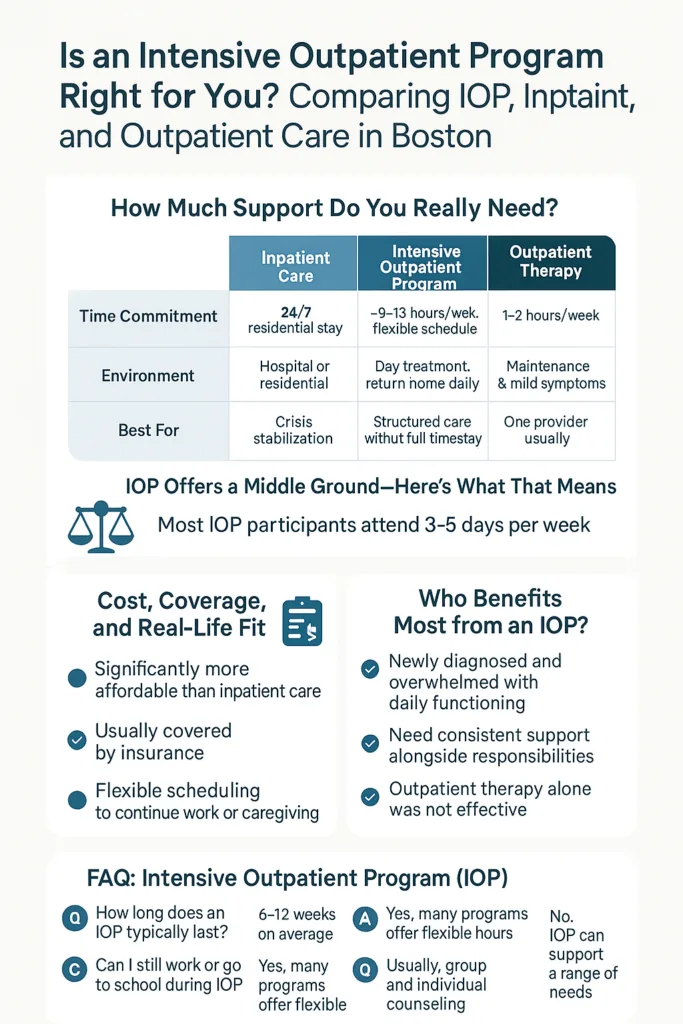When you’ve just been diagnosed with a mental health condition, everything can feel like too much at once. The vocabulary is unfamiliar. The treatment options are overwhelming. And underneath it all is a quiet question: What’s actually going to help me feel better?
If you’re exploring an intensive outpatient program in Boston, you’re not alone. IOP is often described as the “middle ground” between inpatient care and standard outpatient therapy—but what does that really mean for you?
Let’s break it down.
How Much Support Do You Really Need?
Here’s a simplified look at how inpatient care, IOP, and outpatient therapy compare:
Mini Comparison Table
| Feature | Inpatient Care | Intensive Outpatient Program (IOP) | Outpatient Therapy |
|---|---|---|---|
| Time Commitment | 24/7 residential stay | ~9–15 hours/week, flexible schedule | 1–2 hours/week |
| Environment | Hospital or residential | Day treatment, return home daily | Fully at-home |
| Best For | Crisis stabilization | Structured care without full-time stay | Maintenance & mild symptoms |
| Access to Care | Full team, all day | Multidisciplinary, part-time | One provider, usually |
This table simplifies things—but what matters most is how it feels to be in each level of care. Inpatient is immersive but disruptive. Outpatient is flexible but might feel too light. IOP exists for the people who need more but still want to live their lives.
IOP Offers a Middle Ground—Here’s What That Means
Think of IOP as a bridge between safety and independence.
You’re getting structured support—like group therapy, individual counseling, medication management, and skill-building workshops—without needing to step away from work, school, or family.
Stat Block
Most IOP participants attend 3–5 days per week.
That consistency provides the rhythm and reinforcement that many people need during early mental health recovery.
It’s common to feel unsure if IOP will be “enough” or worry that it might feel like too much. But many clients find it’s just right: intensive enough to create momentum, flexible enough to feel manageable.
Cost, Coverage, and Real-Life Fit
Let’s talk logistics—because your mental health treatment shouldn’t come with financial guesswork.
Compared to inpatient care, IOP is significantly more affordable, and it’s usually covered by insurance. Many people newly diagnosed with a condition are already navigating medical bills, work interruptions, or financial pressure. IOP offers access to high-quality care without the high price tag of residential treatment.
Quick practical highlights:
- Most insurance plans in Massachusetts cover IOP services.
- Flexible scheduling means you can continue working or caregiving.
- Transportation or telehealth options may be available for accessibility.
Still have questions about what insurance covers? Call us at Greater Boston Behavioral Health and we’ll walk you through it.
Who Benefits Most from an IOP?
If you’re in Boston, newly diagnosed, and feeling like traditional therapy isn’t quite cutting it—but full inpatient care feels too drastic—IOP might be the match.
You might benefit from IOP if:
- You’ve just been diagnosed and feel overwhelmed by day-to-day functioning.
- You want consistent support but still need to maintain responsibilities.
- You’ve tried outpatient therapy and felt like it wasn’t enough.
- You’re transitioning out of inpatient or partial hospitalization and want to sustain progress.
We’ve seen this structure work especially well for people who are high-functioning but struggling quietly, or those who’ve been masking symptoms for months before getting diagnosed.
You don’t have to hit “rock bottom” to qualify for IOP. You just have to need more help than once-a-week therapy can provide.
Choosing Confidence Over Confusion
Making a treatment choice doesn’t have to be an all-or-nothing decision. The goal isn’t to “get it perfect”—it’s to get started with a format that offers stability, insight, and healing.
At Greater Boston Behavioral Health, our intensive outpatient program in Boston, MA is built with flexibility and clarity in mind. We work with you to create a plan that honors your life and your mental health.
Ready to Talk Through Your Options?
Choosing the right level of care doesn’t have to be a solo decision. Call us today at (888)301-8072 to speak with a care coordinator. We’ll answer your questions, listen to your concerns, and help you figure out if IOP is the right fit—for right now.
FAQ: Intensive Outpatient Program (IOP)
How long does an IOP typically last?
Most programs last 6–12 weeks, depending on your needs and progress. You’ll meet several times per week for therapy and support sessions.
Can I still work or go to school during IOP?
Yes. That’s one of the major benefits. IOP sessions are often scheduled in the morning, afternoon, or evening to accommodate different life commitments.
Is IOP only for people with severe mental health issues?
No. IOP is for anyone who needs more than weekly therapy but doesn’t require 24-hour supervision. It’s great for people who are newly diagnosed and feeling overwhelmed but stable enough to be at home.
What kind of therapy happens in an IOP?
Most IOPs include group therapy, individual counseling, medication support (if needed), and psychoeducation on skills like emotional regulation and communication.
Do I need a referral to join an IOP at Greater Boston Behavioral Health?
Not necessarily. You can reach out directly, and we’ll walk you through an intake process to determine fit and help you navigate insurance if needed.


